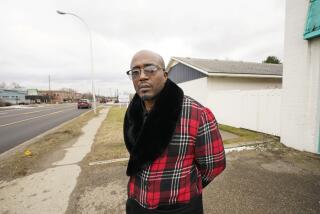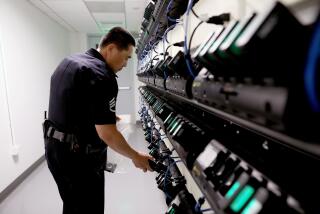Iraqis More Eager to Help Police
BAGHDAD — The back bumper on the Oldsmobile was so low that it nearly scraped the ground. The driver had parked hurriedly, bumping over the curb to get closer to the mosque. He left the car so quickly that he didn’t even close the door.
A neighbor of the mosque phoned in the suspicious incident to 104, the Iraqi capital’s equivalent of 911. A team from the newly trained bomb squad arrived within minutes. The street in the Karada neighborhood, flanked by apartment buildings, shops and modest homes, had already been cleared and blocked off by patrol units.
“There were 750 kilograms [1,650 pounds] of explosives in the car. It would have been a catastrophe if we hadn’t defused it,” said Maj. Mounir Said, head of the demolition team that is in keen demand in nerve-jangled Baghdad.
Since the U.S. transferred sovereignty to an interim Iraqi government June 28, police said, the phones have been ringing with increasing frequency in Baghdad’s police stations with residents’ tips about unfamiliar characters lurking in their neighborhoods, vehicles left unattended and unidentifiable contraptions on the roadsides, in doorways and outside electrical plants.
Most of the intelligence reports are false alarms, said Maj. Basil Abid Aziz, whose precinct received the emergency call on the Karada car bomb. Spooked by a drumbeat of deadly explosions during the 15-month U.S.-led occupation, Iraqis fear the worst when they see the unusual, the deputy police chief said.
Although car bombings have rattled Baghdad in recent days, killing at least 20 people, a new willingness of Iraqis to cooperate with authorities has enabled police to gain some ground on violent extremists. At least six car bombs have been found and defused this month because of timely reports from the public, said the bomb squad’s deputy director, Mustafah Ahmad.
Authorities have no comparative statistics for the time when U.S. officials were in charge, but they say Iraqis are far more eager to cooperate with fellow Iraqis than they were with the occupiers.
“They’ve become much more willing, and as a result we’ve become much more effective,” Mouwafak Rabii, Iraq’s national security advisor, said of Iraqis tipping off police to militant actions aimed at undermining the new leadership. Pointing to the discovery of a car-bomb factory in Baghdad this month, Rabii said the informant was “an ordinary peasant.”
Officials attribute the surge in information to growing public trust in and respect for the Iraqi Police Service, the law enforcement body that has emerged to not only retrain remnants of the force that served former President Saddam Hussein but also recruit officers. As the number trained in special weapons and explosives demolition rises, Iraqis are seeing their countrymen tackling threats to peace, which boosts their confidence in domestic forces’ ability to protect them, Aziz said.
Iraq’s security formally remains a responsibility of the U.S.-led multinational force in the nation, but Baghdad street patrols are almost exclusively the domain of the 15,000 Iraqi beat cops on duty.
The image of Iraqis handling their own security matters has vastly improved police abilities to get people to play a role in their own protection, officers said. In addition to the expanded and better-equipped bomb squad, the police have recently added a major crimes unit, a crime scene investigation force and a national emergency response team. The last is being formed to combat terrorism and wide-scale civil unrest.
“We’re definitely getting more intelligence now,” Aziz said. “The police presence in the street gives people psychological confidence in their law enforcement system. They see that police are risking their own lives to protect them, and that goes a long way to gaining public trust.”
The now-disbanded occupation government identified the Iraqi preference for national control of security in its research. A U.S. State Department survey found that nearly 80% of Iraqis trusted their local police officials and that 70% believed that Iraqi police were accessible and responsive to their calls for help.
By year’s end, 20,000 police recruits will have undergone specialized training in Jordan or at the Baghdad Police Academy, funded by a $3.2-billion U.S. budget outlay for Iraqi security improvements.
Last week, interim Prime Minister Iyad Allawi announced the formation of a special internal security service, expected to emerge as the Iraqi equivalent of the FBI. Some intelligence operatives from the disbanded security forces of Hussein’s regime are expected to be included, as Allawi’s government begins to roll back the blanket disqualification of former Baath Party members and military intelligence agents from such service.
“When we see our police risking their lives to prevent bombs going off and killing hundreds of people, this is very inspiring,” said Fatan Mehdi, a government accountant who lives and works near the area where the Oldsmobile car bomb was defused.
A neighborhood watch scheme has formed among patrol units and rations distributors, Aziz said. The government workers dispensing monthly allotments of staples and household products know their neighborhoods intimately and are the first to spot outsiders or suspicious behavior, he said. The rations stores are also hotbeds for gossip, exposing the distributors to all manner of information.
Fueled by the quickening flow of public intelligence, police waged a sweeping crackdown on thieves, kidnappers and other common criminals in the capital last week, arresting more than 500 people and confiscating 4 tons of explosives. The action drew complaints from some citizens who considered the tactics heavy-handed or directed at small fry, but police contended that such sweeps enhanced their public image.
“This was a very effective operation to prove that the police are strong and in control, especially since police lost their credibility during the past year of occupation,” said Maj. Abdel Hakim, who took part in the raids. “People have started to look at us differently.”
In the Kifah Street area, known as a hide-out for bandits and organized-crime kingpins, Maj. Mustafah Said brushed off some residents’ complaints that masked police in the raids were instilling fear in the public.
“Let them talk about us,” he said with a shrug, suggesting that those condemning the raiders’ tactics were few and probably hiding something. “Some people hailed us while we were carrying off the suspects.”
A captain at the raid scene, who declined to give his name, said the sweep was the first step in the interim government’s plan to crush the crime wave terrorizing Baghdad’s residents as well as the insurgents who target the multinational forces and those seen as collaborators.
“We’ve been getting better intelligence since emerging from the shadow of the U.S. troops,” he said. “God willing, there’s even more coming.”
*
Times special correspondent Ashraf Khalil contributed to this report.
More to Read
Sign up for Essential California
The most important California stories and recommendations in your inbox every morning.
You may occasionally receive promotional content from the Los Angeles Times.











